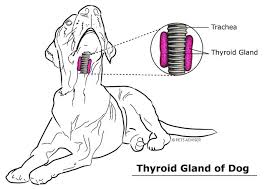
Diagnosis is often complicated by the fact that many non-thyroidal illnesses (NTI) may present with comparable features to hypothyroidism and can also result in reduced thyroid output. There is no one lab test for the diagnosis of hypothyroidism and the available alternatives all have their own strengths and weaknesses that need to be taken into account. Often the wisest approach is to use a multitude of tests that will complement one another and help to improve a diagnosis.
When hypothyroidism is a possibility, making the diagnosis will require two distinct steps:
1. Exclude non-thyroidal illness (NTI).
By first excluding other disease conditions the predictive value of any thyroid tests will be significantly increased. In general terms this phase may include a profile which includes FBC and smear evaluation and when necessary screening tests for a disease called Cushings. The latter can be important as both endocrinopathies can result in alopecia, excessive weight gain and marked reductions in T4.
2. Run a screening test for hypothyroidism.
Basal T4 is sensitive but not necessarily specific for hypothyroidism. As a result, a clearly normal T4 will reliably exclude hypothyroidism in most cases. Basal T4 is included in the CTDS Canine Endocrine Profile. While almost all dogs with hypothyroidism have a reduced basal T4, many dogs with NTI will also have a low T4. To help improve the specificity of T4 the test is often coupled with TSH assay. T4 with TSH works well as a relatively inexpensive screening test for hypothyroidism and can be run alongside or following the endocrine profile.




